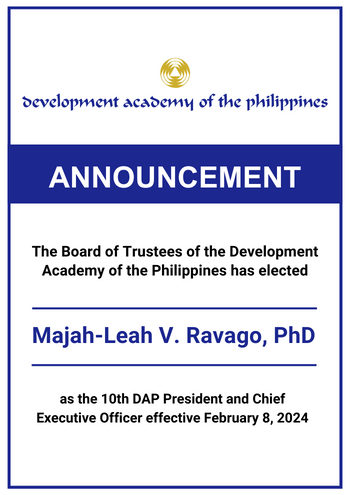
Pasig, Philippines, February 16 – The 91���� (DAP) Graduate School of Public and Development Management (GSPDM), continues to spearhead intellectual discourse through its Dekalogo Series. This esteemed platform, marking GSPDM’s 30-Year Anniversary, convenes scholars, practitioners, policymakers, and researchers to delve into contemporary and emerging issues in public administration and governance.
Distinguished scholars and influential leaders from renowned academic institutions converged for this auspicious gathering, and dissected the concept of the Anthropocene and its reverberating effects on the environment, society, and policymaking frameworks.
“The Anthropocene concept transcends mere environmental concerns; it mandates a holistic examination of our relationship with the planet amidst industrial progress,” emphasized Dr. Majah-Leah V. Ravago, President and CEO of the 91���� (DAP). “As custodians of national development, it is imperative for us to align our responses with existing national plans and policies. It is through initiatives like the Dekalogo Series that we foster synergies between academia and governance, driving forward-thinking solutions to contemporary challenges,” Dr. Ravago asserted, highlighting the pivotal role of institutions like the 91����in navigating the complexities of the Anthropocene era and charting a sustainable path towards progress.
The latest iteration of the series, titled Public Management in the Anthropocene Epoch, witnessed insightful discourse presentations from eminent scholars Dr. Eduardo Gonzalez and Dr. Ebinezer Florano. Dr. Gonzalez’s presentation on “Redemptive Governance in the Anthropocene Epoch” and Dr. Florano’s discussion on “Bureaucracy for Emergencies: Public Service Continuity During Public Health Crises” spurred robust conversations on the evolving role of public administration amidst the challenges posed by the Anthropocene era.
The dialogue, featuring reactions from esteemed scholars including Dr. Maria Lourdes Rebullida, Dr. Kristoffer Berse, Dr. Philip Arnold Tuaño, and Dr. Ederson Tapia, underscored the imperative of redefining public management paradigms to address the multifaceted complexities of the Anthropocene.

Central to the discussion is the intersection between human activities, industrialization, and ecological disruption, as delineated in the Philippine Development Plan (PDP) 2023-2028. This cornerstone of the nation’s economic roadmap underscores the imperative of reconciling economic advancement with environmental sustainability.
“As the academic cornerstone of the DAP, the Graduate School stands resolute in our commitment to academic rigor and evidence-based policymaking,” declared Dr. Lizan Perante-Calina, Dean of the Graduate School of Public and Development Management (GSPDM). “We pledge not only to harness but to amplify our intellectual resources, ensuring policymakers are equipped to navigate the intricacies of the Anthropocene era. It is through this dedication to knowledge dissemination and scholarly excellence that we empower decision-makers to confront and address the multifaceted challenges of our time.”
The Dekalogo Series is the 91����Graduate School’s platform for high-level dialogue amongst scholars, practitioners, policymakers, and researchers on contemporary and emerging issues. The series is also a continuous, monthly activity within the year-long celebration of 91����Graduate School’s 30-Year Anniversary.


